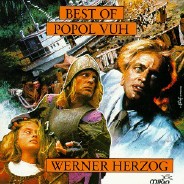| Strona główna | Biografia | Dyskografia | Muzyka filmowa | MP3 |
|
|
|
|
| Strona główna | Biografia | Dyskografia | Muzyka filmowa | MP3 |
|
|
|
|
 |
BEST OF FILM MUSICCD 1993 Milan 35639-2, USA
Personnel: Florian Fricke (piano, synclavier, vocals), Renate Knaup-Aschauer (vocals), Daniel Fichelscher (guitar, drums), Al Gromer (sitar). Additional personnel: Kristen Riter (vocals), Bob Elisco (oboe), Choir Of The Bayerischen Staatsoper.
|
Reviews
Werner Herzog Film Music. The brilliant German director Werner Herzog worked exclusively with Popol Vuh on his films, and only Popol Vuh could musically express the powerful images in Herzog's work. By turns haunting, majestic, darkly gothic and romantic, Popol Vuh's scores are often cited as an integral part of Herzog's films. Best of includes music from NOSFERATU, FITZCARRALDO, COBRA VERDE and AGUIRRE, THE WRATH OF GOD.
Milan Records catalogue
The many collaborations between German composer Florian Fricke (with his group Popol Vuh) and fellow countryman, film-maker Werner Herzog, are almost unique in the cinema of recent decades: conjure up the exotic landscapes of the latter's epic feature films and you start to hear the former's music (perhaps the Nyman-Greenaway collaborations are the only other in recent times to have attained a similar level of music-image symbiosis). Yes, Fricke and Herzog speak the same expressionistic language, often cloaked in Stimmung - that special Teutonic mood described by film historian Lotte Eisner as "a mystical and singular harmony amid the chaos of things, a kind of sorrowful nostalgia mixed with well-being languor coloured with desire, lust of body and soul."
The Haunted Screen
Three pieces from Nosferatu (1979) and Fitzcarraldo (1982), two from Cobra Verde (1988) and one each from Gasherbrum (1985) and Aguirre, Wrath Of God (1972). All are grandiose in conception, atmospherically counterbalancing choral arrangements (shades of Carl Orff) with the lyrical folk-rock of Popol Vuh. 'A Different World' (from Cobra Verde) is sumptuous, dreamy adagio strings, suffused with that "sorrowful nostalgia"; 'Brothers Of Darkness' (from Nosferatu) evokes ancient, supernatural malevolence tinged with irreconcilable despair. Florian Fricke's film music is as memorable and as distinctive as the work of Morricone and Rota. It's time he reached an audience beyond the realm of Krautrock diehards.
Chris Blackford's film music review
Popol Vuh were (are?) a German group, built around the nucleus of Florian Fricke and Daniel Fichelscher, who began their career in the early seventies. Their music always had religious overtones, with chants and such accompanied by electric guitar and keyboards in a rock context. The resulting effect caused Werner Herzog to be so taken that he commissioned Popol Vuh for most of his soundtracks. This is a collection of music from some of Mr. Herzog's movies, and covers the period 1973-1987. It is also a very decent introduction to Popol Vuh's style, useful for those who desire to explore the stylings of one of the more unique bands to emerge from the "Krautrock" scene. However, in recent years Popol Vuh's music has become more meditative and spacy, and could be classified within the new-age genre. Their full range of styles is showcased in this compilation.
Dirk Evans